Kiribati
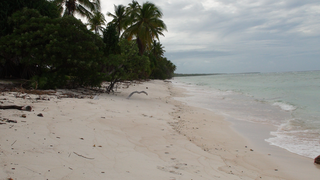
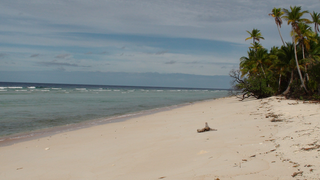
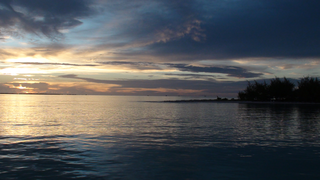
Kiribati is a beautiful and wondrous place with a unique culture.
However, most of the population are unemployed and do not have safe drinking water, sanitation or electricity. Physical assets are lacking or are in complete disarray.
Kiribati's severe difficulties cannot all be laid at the door of climate change. Overcrowding, unemployment, dwindling fresh water, ramshackle roads, poor quality houses and disease negatively impact Kiribati. The impact of climate change might be the tipping point which in combination with these already severe problems may devastate Kiribati.
This website is to focus on the plight of the people - social, economic and environmental.
By examining the issues I endeavour to create solutions to assist. The more understanding you have of another's plight the easier it is to show kindness and compassion. I feel compelled to help these people and I hope that you do too.
Economic
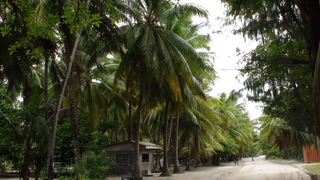
Coconut
Coconut is the most abundant plant in Kiribati
Agriculture
Most of the working population is involved in subsistence agriculture. Agricultural production is constrained by inherently poor soil conditions, lack of surface water sources, land tenure and the geographical scattered nature of the islands.
Read more...
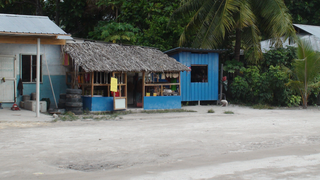
Small Stores
Bubuti makes it difficult to begin as small business
Bubuti
Bubuti occurs when an extended family member in need makes a "non-refusable request" to another family member who has to comply. Non-compliant family members would be shamed and ostracised as they were said to lack compassion. Bubuti can act as a tax on working people and reduce their willingness to invest in business and has damaged economic growth.
Read more...
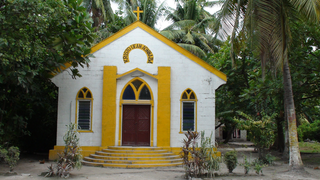
Churches
Church income is utilized to build and maintain elaborate buildings
Cash
A cash economy is increasingly replacing the traditional subsistence lifestyle. Education and the church are the two main areas of expenditure.
Read more...
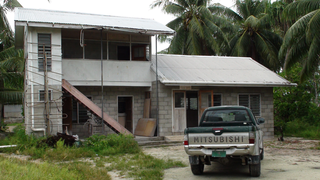
Newspaper and Radio Station
Kiribati Newstar newspaper and FM89 radio station are located in this building
Communication
Kiribati covers a vast distance. The large distances between the islands means that many people have little access to electronic communications. Kiribati does not have access to a submarine fibre optical cable so must rely on satellite for telecommunication and internet. This increases the cost of communication.
Read more...
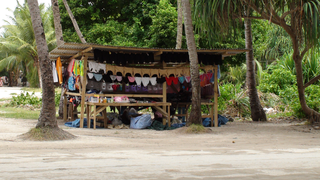
Small Stores
Shops are small and often scattered along the roadside
Economy
Kiribati is one of the poorest and most remote microstates in the Pacific. Economic activity in Kiribati is constrained by isolation, limited natural resources and a fragile environment. A large proportion of the population are unemployed.
Read more...

Energy
Energy
Kiribati relies on imported fuels for electricity generation, transport and cooking. Electricity from the grid serves about half of the households in Kiribati. Solar PV is an important source of energy in outer islands.
Read more...
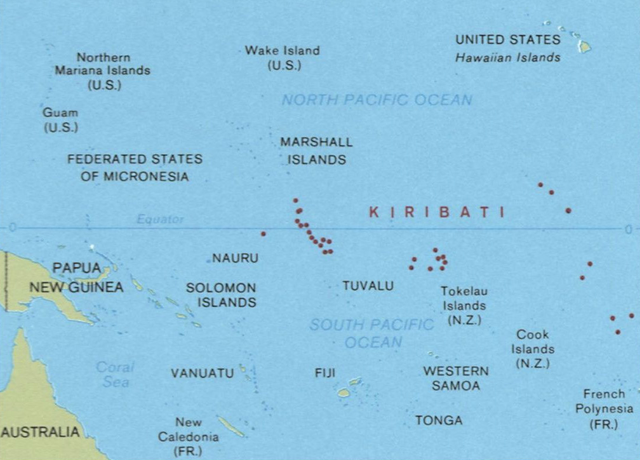
Remote
Kiribati is a long distance from the rest of the world
Geographic
Kiribati is significantly disadvantaged by distance from global markets. This is exacerbated by the dispersion of its many islands.
Read more...

Roads
The roads are full of potholes
Infrastructure
Overall infrastructure in Kiribati is quite rudimentary. The physical infrastructure necessary for economic development - electricity, transport (roads, ports and airports), water supply and sanitation is weak in Kiribati.
Read more...
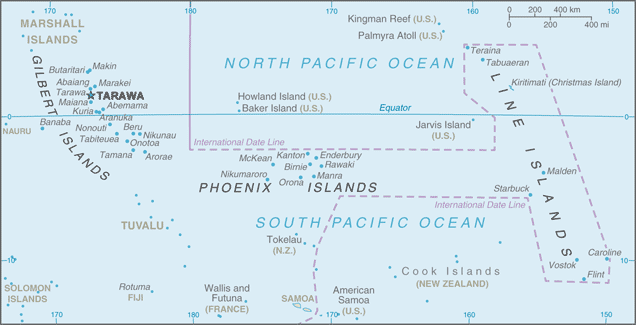
Remote
Kiribati is spread over a wide area
Land Ownership
Gaining access to land is one of the major constraints for economic development in Kiribati.
Read more...

Tourism
Tourism
Currently, tourism is nearly non-existent in Kiribati. Air transportation presents a major constraint for tourism development as Kiribati is not located on major air routes.
Read more...
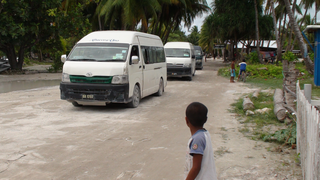
Minivan
A constant stream of minivans service South Tarawa from Betio to Buota (the end of the road)
Transportation
Given the geographical dispersion and isolation of Kiribati, transportation is very important for the people and government. However, running and sustaining a transportation system in Kiribati is very expensive.
Read more...
Environmental

Climate Change
Climate Change
Climate change is one of Kiribati's most pressing issues. The impacts of climate change to the very sustainability of the atolls of Kiribati is very real. Climate change is a challenge which impacts not only the environment but also affects economic, social and political development.
Read more...
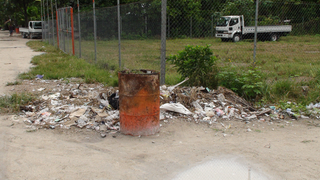
Rubbish
There appears to be rubbish all over South Tarawa
Waste Management
Poor waste management is one of the major environmental problems in Kiribati. It poses a serious threat to health, erodes the economy, affects future development and is a deterrent to tourism.
Read more...

Tap Water
The treated tap water is not suitable for drinking and contains particles
Water
Among the Pacific Island nations, Kiribati has the lowest proportion of households with sustainable access to an improved water source such as piped water, protected well and rainwater. Unsafe water is the main cause of water borne diseases in Kiribati.
Read more...
Social

Domestic Violence
Domestic Violence
Kiribati women face a high level of domestic violence. More than 68 per cent of women aged 15 to 49 years who had been in a partnership had experienced physical or sexual violence.
Read more...

Education
Education
The Kiribati Government acknowledges the importance of providing a relevant and quality education for all children in improving the socio-economic outlook for the country as a whole. A qualified domestic work force is imperative for Kiribati to progress. Currently, Kiribati's economic prospects are hampered by low skill levels.
Read more...

Health
Health
Health indicators are gradually improving in Kiribati. However, Kiribati has low life expectancy, the highest under five mortality rate in the Pacific and a high incidence of nutrition related diseases. Poverty, overcrowding and the adoption of Western style diets have negative health consequences in Kiribati.
Read more...
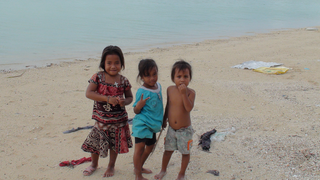
Kids
The children are happy and friendly
Population
Population growth remains high at 1.8 per cent a year. High fertility is a key cause of this rapid population growth. Migration to South Tarawa has contributed to poor housing and sanitary conditions. This overcrowding is a major contributor to disease and impacts the water lens.
Read more...
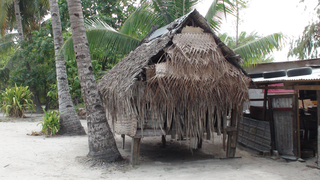
Traditional Houses
A large proportion of the Kiribati population live in traditional housing even in urban areas
Poverty
Poverty in Kiribati does not mean hunger or destitution in the traditional sense but rather that many households are struggling to meet their basic living expenses on a daily or weekly basis. It is estimated that around one-in-five households and almost one-in-four of the population of Kiribati may be living below the basic needs poverty line. Poverty of opportunity is widespread in Kiribati as there is limited economic opportunities for earning an income.
Read more...
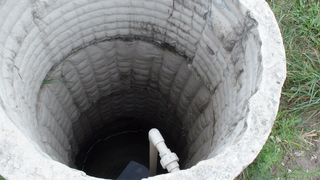
Well Pumps
Some wells have pumps to help distribute the water
Sanitation
The majority of the population in rural areas use the beach for defecation. Flush toilets are used mostly in urban areas but a high proportion of the population in urban areas still use the beach and the bush. Defecation at the beach and in the bush increases the spread of water borne diseases especially diarrhoeal diseases.
Read more...
